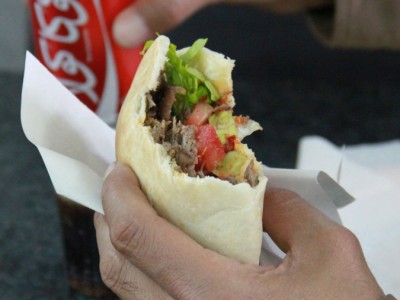
左:「那些移民會讓這個國家的犯罪率升高。」右:「為了想要扭轉人生而離開自己的國家,並不是罪。」(圖片來自相關非政府組織,由〔瓜達拉哈拉(Guadalajara)耶穌會大學(ITESO)所屬的〕跨領域社會參與暨訓練中心分享〔於其臉書專頁〕;係經許可使用於此)
在來自中美洲的移民遠征隊過境墨西哥之際,許多墨西哥民眾在社群媒體上表達了自己對於移民那種沒來由的偏見──〔聽來〕和美國人對於墨西哥移民所抱持的反感幾乎如出一轍。
數以千計的中美洲民眾,為了逃離家鄉的貧困生活和幫派的暴力威脅,正在向北進發。他們多數步行、常有幼童隨行,但目的(地)卻未必相同:許多人立意前往美國──在那兒等著他們的,是一場大規模的軍事行動;其他人則計畫要在墨西哥尋求庇護。
截至十一月初,已有五個遠征隊自中美洲出發;其中有些隊伍是透過臉書(Facebook)集結。在最初幾支隊伍陸續開至〔墨西哥〕境內的時候,墨西哥網民在社群媒體上炸開了鍋,諸如 #CaravanaMigrante(移民遠征隊)和 #CaravanaMigranteCDMX(墨西哥市移民遠征隊)一類的主題標籤紛紛出籠。
雖然墨西哥網民反應不一,多數還是對遠征隊表示同情;但在這中間,也有另一種聲音,毫不掩飾他們對於移民的不信任。以下便是兩例:
Que nos llamen fascistas o hijos de Donald Trump. Como mexicanos tenemos el derecho de defender la soberanía de nuestro país y la seguridad de nuestras familias. No a la #CaravanaMigrante y que se regresen a construir y trabajar en su país que es donde más hacen falta
— Joe Kenobi (@blackshadowjedi) 19 de octubre de 2018
Let them call us fascists or sons of Donald Trump. As Mexicans, we have the right to defend the sovereignty of our country and the security of our families. No to the #MigrantCaravan. They should go back to their country and work there where they're needed.
隨便他們要叫我們法西斯主義者,還是要說我們和川普(Donald Trump)一個鼻孔出氣。作為墨西哥人,我們有權捍衛國家主權和家人安危。向 #MigrantCaravan(移民遠征隊)說不。他們應該回去自己的國家,去需要他們的地方討生活。
Muy difícilmente pasarán a USA, dudó mucho que regresen a su país de origen; se van a quedar en México ¿esperando qué? ¿que el gobierno los mantenga? #CaravanaMigrante
— Adriana Sandoval ?️? (@adrisandooval) 19 de octubre de 2018
It's unlikely they'll enter the USA, I really doubt that they will go back to their country of origin. They will stay in Mexico, but hoping for what? For the government to provide for them?
他們不太可能進得了美國。我也很懷疑,他們會〔願意〕回去自己的國家。他們會在墨西哥待下來。但他們又期待些什麼?政府的接濟嗎?
網路傳媒 Plumas Atómicas 匯集了許多諸如此類的看法,並把它們拿來和墨西哥自身的移民史相對照:
México tiene una larga y orgullosa tradición de puertas abiertas ante las poblaciones perseguidas, exiliadas y violentadas: desde los judíos españoles durante la Nueva España; los irlandeses que se unieron a la defensa de México durante la invasión estadounidense; los libaneses que huyeron de la hambruna en su país en la década de 1920, los republicanos exiliados durante la Guerra Civil española y tras la victoria de Franco; los brasileños, argentinos, paraguayos, colombianos, peruanos y uruguayos que salieron perseguidos por las dictaduras militares en sus países […] ¿por qué hay exiliados y refugiados de primera y de segunda?
Mexico has a long and proud tradition of open doors to those who have been persecuted, exiled, or victims of violence: since the Spanish Jews during the time of New Spain; the Irish who joined Mexico's defense during the American invasion; the Lebanese that fled hunger in their country in the 1920s, the republicans exiled during the Spanish Civil War and after Franco's victory. Brazilians, Argentinians, Paraguayans, Colombians, Peruvians and Uruguayans who were persecuted by the military dictatorships in their countries […] Why are there first and second class of exiles and refugees?
墨西哥長久以來都以一項傳統為榮──它向那些被迫害、不得不流亡異鄉或者蒙受暴力威脅的人張開雙臂:新西班牙時期的西裔猶太人、美墨戰爭期間為墨西哥效力的愛爾蘭人、1920 年代來自黎巴嫩的逃荒者、西班牙內戰期間乃至佛朗哥派取得勝利後流亡海外的共和派人士,還有那些在自己的國家裡遭到軍事獨裁政權迫害的巴西人、阿根廷人、巴拉圭人、哥倫比亞人、秘魯人和烏拉圭人〔⋯⋯〕一樣都是難民、一樣離鄉背井,難道彼此之間還有高低之分嗎?
其他的評論家也紛紛指出,墨西哥網民的種族歧視是多麼地諷刺;因為一直以來,在川普的移民政策之下被污名化的,主要便是墨西哥人。
Este meme sobre la caravana migrante nos pone justo frente al espejo racista del nacionalismo mestizo mexicano, que siempre ha sido aspiracional (a ser blanco) y que por 1a vez en la historia es amenazado por una migración del sur. Me temo que habrá mucho más de esto en el futuro pic.twitter.com/NuaSJb3PRd
— Patricio Solís (@psolisaqui) 22 de octubre de 2018
This meme about the migrant caravan places in front of us the racist mirror of Mexican mestizo nationalism, which has always been aspirational, longing to be white, and that for the first time in history feels threatened by migration coming from the south. I'm afraid we will have more of this in the future.
關於移民遠征隊的這張梗圖,在我們面前放上了一面種族歧視的照妖鏡──源於〔大力擁抱〕混血主義、卻總〔私心〕嚮往白人膚色的墨西哥民族主義。有史以來第一回,〔墨西哥人〕因為來自南方的移民而感到備受威脅。恐怕將來這種事只會多、不會少。
推文中這張圖的左邊,是反移民的聲音:「請了解,無論是為了人身安全、貧窮問題、人口過剩或什麼其他問題,移民遠征隊都不應該過路墨西哥」;圖的右邊,則是在為移民說話:「我們得幫幫他們、浪他們唬口飯吃。平平都是輪⋯⋯輪家又哪裡礙到你們了?老天保佑喔」。而後面這段話,卻錯字百出,暗指那些為遠征隊說話的人教育水準不高、來自低下階層。
Negarles a quienes vienen en la caravana migrante un trato digno y humanitario nos pone al nivel de los gobiernos xenófobos y racistas que llevamos años criticando. No debemos caer en la trampa de la retórica anti-inmigrante que viene desde el gobierno de los Estados Unidos.
— Miguel Carbonell (@MiguelCarbonell) 24 de octubre de 2018
By denying a decent and humanitarian treatment to those coming with the migrant caravan we're brought down to the same level of the xenophobic and racist governments that we've been critisizing for years. We must not fall into the trap of the anti-migrant rhetoric that is coming from the government of the United States.
如果我們拒絕以有尊嚴、人道的方式去對待移民遠征隊成員,那我們和自己長年來所批評的那些種族歧視的排外政府,又有何異。我們不可以落入(和來自美國政府的言論相同的)那種反移民心態。
「在自己的國家裡,找不到容身之地」
這波前所未見的移民潮主要是源於北三角地區(Northern Triangle)──涵蓋了貝里斯(Belize)、瓜地馬拉(Guatemala)、薩爾瓦多(El Salvador)與宏都拉斯(Honduras)幾個國家。當地的貧窮與暴力問題,讓人們苦不堪言,亟欲逃離。
在一篇十一月三日的社論中,薩爾瓦多傳媒 El Faro 略述了這波移民潮的背景,並主張,美國和中美洲各國政府都得為這數千人,如今「在自己的國家裡,找不到容身之地」負起責任:
¿De qué se alejan familias enteras expuestas al camino cruel, al poder de los territorios del narco, a la violencia sexual, al secuestro, y hoy incluso a las amenazas del presidente de Estados Unidos de enviar al ejército? […] Huyen de la represión de un tirano en Nicaragua y de los delirios de un corrupto incapaz en Guatemala. Huyen de la incapacidad de los gobiernos salvadoreños, tanto de ultraderecha como de ultraizquierda, para poner fin a los homicidios, a la desigualdad y a la corrupción. Huyen de la violencia ejercida por pandillas deportadas por Estados Unidos, que exige ahora lealtades a cambio de migajas, cuando es corresponsable de la situación en el istmo. Huyen de élites indolentes y de décadas de esperar un futuro que nunca llega.
What are those whole families running away from, exposing themselves to a cruel route, to the territory of druglords, to sexual violence, to kidnapping, and even to threats by the president of the United States, who says he will be sending the army [to the border?] They're running away from a tyrant's repression in Nicaragua, from the delirium of a corrupted fool in Guatemala. They're fleeing from the inability of El Salvador's government, from both the ultra-rightwing and ultra-leftwing, to put an end to the homicides, the inequality and the corruption They're fleeing from the violence of gangs who have been deported by the United States, who now demand loyalty in exchange for crumbs, even when they're also responsible for the situation in the region. They're running away from oblivious elites and from decades of waiting for a future that never comes.
那些人攜家帶眷,踏上危途,進入毒梟的領地,冒著蒙受性暴力、被綁架的風險,還要面對來自美國總統的威脅──他說,要將軍隊送往邊境──是想要逃離什麼呢?他們要逃離的是尼加拉瓜(Nicaragua)暴君的高壓統治,是瓜地馬拉貪腐草包的荒唐行徑。他們要逃離的是薩爾瓦多的無能政府──從極左到極右,都沒有辦法終結貪污腐敗、貧富不均和命案頻仍。他們要逃離的是幫派暴力──來自為美國所驅逐的幫派分子;而對這片土地上的現況也脫卸不了責任的美國,現在卻要求以忠誠來換取施捨。他們要逃離的是那些健忘的菁英分子,以及對於未來,那永無止境的漫長等待。
這篇社論並以此作結:
En esas caravanas están las claves de todos los problemas de la región, incluyendo a México y Estados Unidos. [Su criminalización significa] culpar a los migrantes por las respuestas que los gobernantes de la región, de Managua a Washington, no saben encontrar.
Those caravans hold the keys to all the problems in the region, including Mexico and the United States.[Criminalizing them] means blaming the migrants for the answers that the governments of the regions, from Managua to Washington, haven't been able to find.
那些遠征隊的人們,是這片土地上所有問題的縮影──墨西哥、美國,全都有分。〔把這些移民當成罪犯〕,無異於是要他們來做替罪羔羊,為這些政府──從馬納瓜(Managua,尼加拉瓜首都)到華府──也沒有答案的事來負責。






